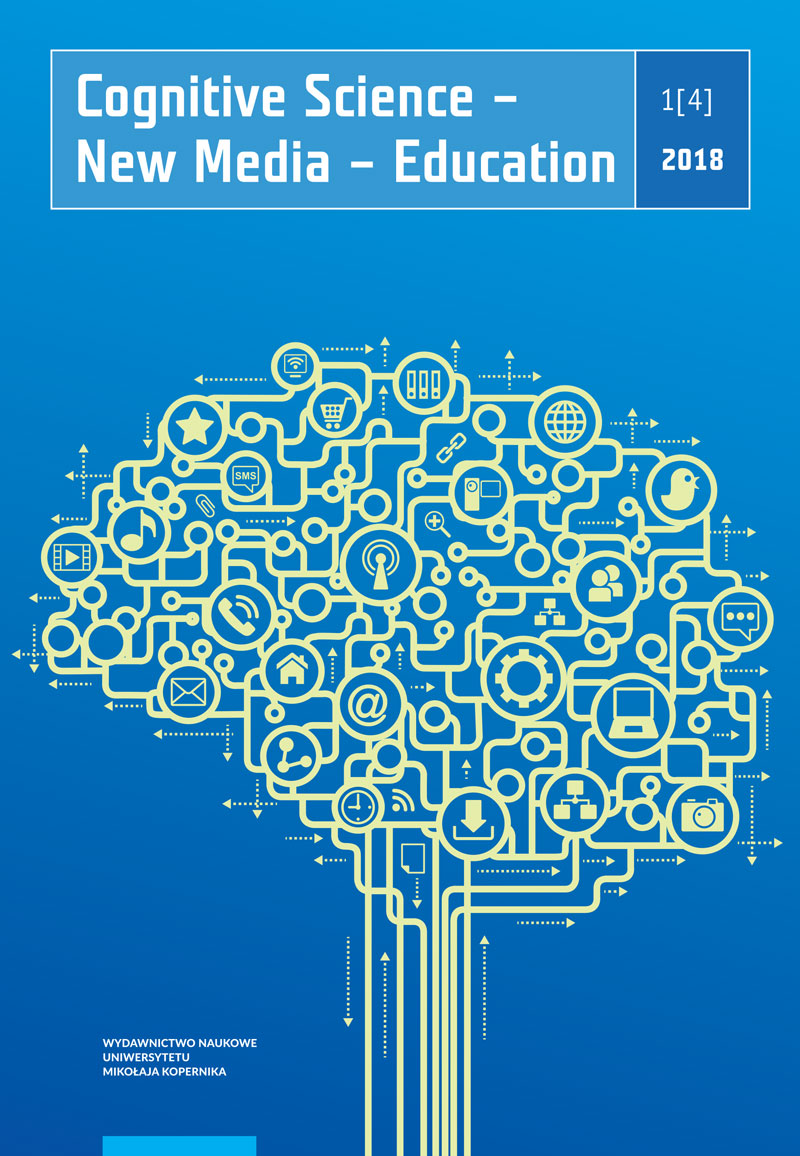Media Literacy – Creative Development of the Skills and Knowledge for the Education in the 21st Century
DOI:
https://doi.org/10.12775/CSNME.2018.001Ključne reči
media literacy, children, creation, knowledge, skill, education, message, critic, curiosity, deceit, society, tradition, new technologies, hidden agendasApstrakt
Media literacy enables primarily children, future citizens for the political choices, to understand political discourse and participation within it. In this way, as mature, media literate, well-informed citizens they will be able to make their own decisions about the democratic electoral process. However, adolescents, young people and adults as well as the oldest citizens often need to be media-literate, especially due to the fact that in the age of new media and new technologies, the knowledge that we possess becomes obsolete very quickly and it is certainly necessary to participate in lifelong learning and within the media literacy of all generations of citizens. Media literacy has dual meaning – as an concept is defined as ability of the approach, analyses, evaluation and transmission of the messages through the media while the essential focus of media literacy is to overmaster with critic and creative skills, knowledge that are of help to connect complex ideas, constantly questioning manifestations, attempt to recognize answers that will satisfy congenital curiosity of any of us, but also to identify individual, and even wider, social deceits. This paper will also present scientific relationship in regards “critical vs. creative thinking about the media and vice versa” and methodology focused on media education and/or education of the media and how to upgrade digital literacy with media literacy by the author in 2018, based on the model of Venkatesh & Devis, from 2000. Media literate society is healthy society of new technological awareness that will unify understanding of tradition and new technologies, that will, within the interaction, help the society to create newly established relations within education on verifiable facts which are so very much visible in the post-modern society of the 21st century. Media literacy enables nation(s) to recognize hidden agendas within the transmission of information not just within the media, but also within the society as the whole, especially within the education. For the purpose of the life-long learning, regardless if we have media literacy as obligatory module in the primary and/or secondary school of we have it within the general educationally planned process of the society as a grown-ups.
Reference
Bell D. (1973), The coming of post-industrial society: a venture in social forecasting, New york: Basic Books.
Brigs M (2007), Journalism 2.0: How to survive and thrive: A digital literacy guide for the information age, K. Lab: University of Maryland.
Chauvin, B.A. (2003), Vizual or media literacy?, “Journal of visual literacy”, No 23(2).
Curtis R. (1973), ‘Media Now’ curriculum of LRC aids students and has nation-wide attention, “Sound Tracts” 7(5). 1–2. Elizabeth Thoman Archive, Kingston: University of Rhode Island, RI.
Curtis R. (1980), Media Now – A Short History, Elizabeth Thoman Archive, University of Rhode Island, Kingston, RI. Hodgkinson, A.W. (1970). An Investigation into the Practice of Screen Education. Washington, DC: Office of Education (DHEW) Bureau of Research.
De Abreu B., Mihailidis P. (2014), Media literacy – education in action – theoretical and pedagogicial perspectives, Routledge (USA & UK).
Eshet-Alkalai Y. (2004), Digital literacy: A conceptual framework for survival skills in the digital era, “Journal of Educational Multimedia and Hypermedia”, No 13(1).
Hadžialić S. (2014), Bosnia and Herzegovina and XXI century – (essays), Publisher Lulu, USA.
Hadžialić S. (2016), South-East Europe at the Edge of Civilisation – (essays) Publisher Eurasia Review, USA.
Hadžialić S. (2018), Bosnia and Herzegovina and XXI century – (essays), Publisher Eurasia Review, USA.
Hadžialić S. (2018), Medijska pismenost vs. političke manipulacije (Translation „Media literacy versus political manipulations), Publisher Internacionalni univerzitet Travnik, Travnik, Bosnia and Herzegovina.
Hobbs R. (2010), Digital and Media Literacy: A Plan of Action, Publisher Asoen Institute, USA.
Lankshear C., Knobel M. (2003), New literacies: changing knowledge and classroom learning, Buckingham: Open Iniversity Press.
Kubey R. (1997), Media literacy in the Information age, Transaction Publishers (USA & UK).
Macedo D., Steinberg S.R. (2007), Media literacy – A Reader, New York: Peter Lang Publishing, USA.
Share J., Lang P. (2002), Media literacy is elementary – teaching youth to critically read and create media, 2nd Edition, USA & UK.
Tyner K. (2010), Media literacy – New agendas in communication, College of Communication, Austin, Texas, USA.
Venkatesh V., Davis F.D. (2000), A Theoretical Extension of the Technology Acceptance Model: Toward a Unified View, “Miss Quarterly”, No 27.
Internet sources
Declaration on Media Education (Grunwald, Federal Republic of Germany), 1977: http://www.unesco.org/education/pdf/MEDIA_E.PDF (approached on 14.05.2018).
Dunkley L., Victoria (2015), The Hidden Agenda Behind 21st Century Learning, “Psychology Today”, https://www.psychologytoday.com/intl/blog/mental-wealth/201509/the-hidden-agenda-behind-21st-century-learning?amp (approached on 14.05.2018).
DIOGEN pro culture magazine, http://www.diogenpro.com
European Convention for the Protection of Human Rights and Fundamental Freedoms (2010 Rome, Italy), https://rm.coe.int/1680063765 (approached on 17.05.2018).
Meyer T., (2002), Media democracy: How the media Colonize Politics, Publisher WILEY, USA, http://www.polity.co.uk/book.asp?ref=9780745628448 (approached on 17.05.2018).
UNESCO (1977), Media studies in education, http://unesdoc.unesco.org/images/0002/000238/023803eo.pdf (approached on 14.05.2018).
Universal Declaration on Human Rights (UN, 1948), http://www.un.org/en/universal-declaration-human-rights/ (approached on 16.05.2018).
Downloads
Objavljeno
Kako citirati
Broj časopisa
Sekcija
Stats
Number of views and downloads: 1027
Number of citations: 0



